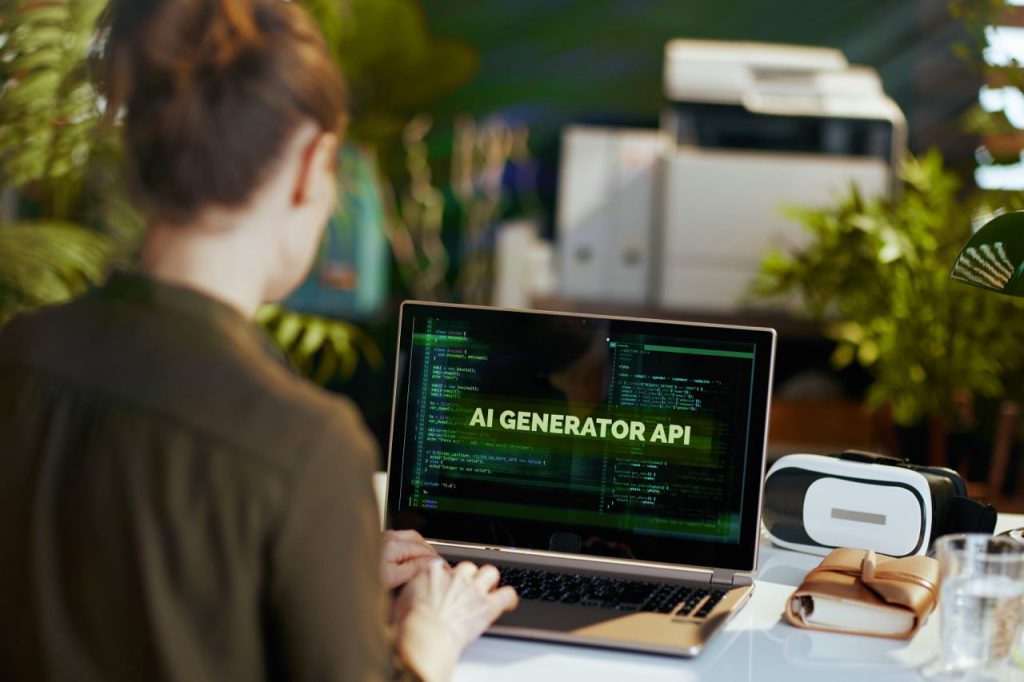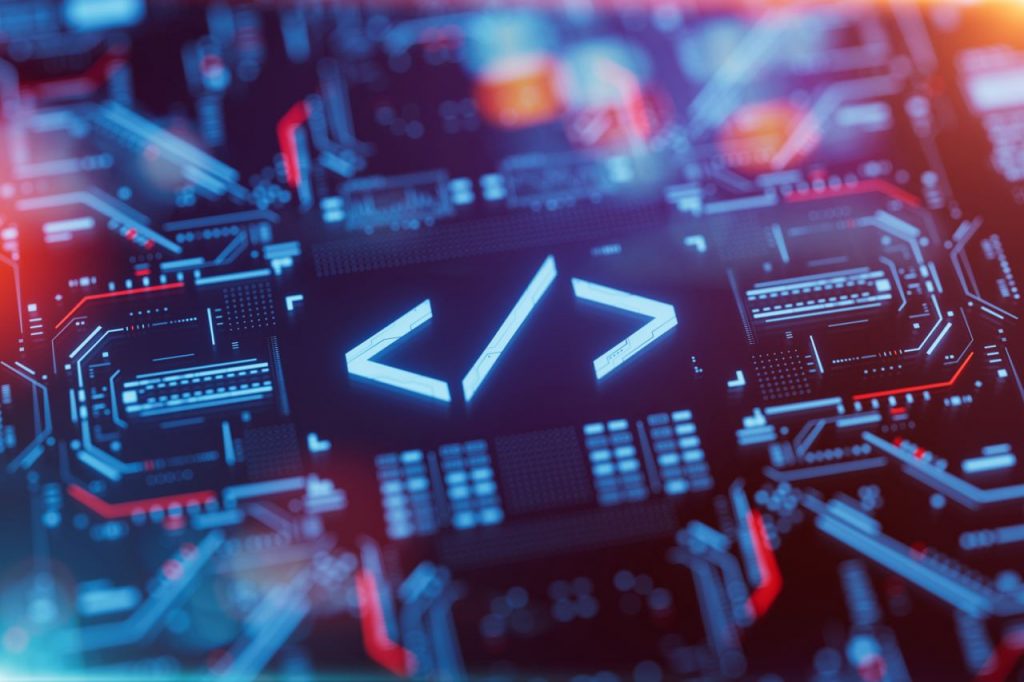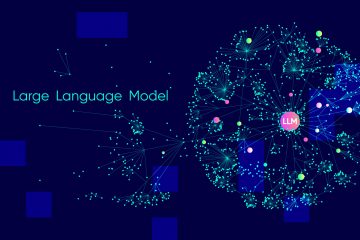The world of software development is on the cusp of a profound transformation, one driven by the inexorable rise of Artificial Intelligence (AI). The utilization of AI in software development has surged in recent years, and the trajectory is poised to redefine the industry in ways previously thought unimaginable.

According to a report published by Gartner, by the year 2025, over 70% of organizations will have incorporated AI into their applications, making it a core component of software development processes. This seismic shift is underpinned by the recognition that AI can bring unprecedented efficiency, accuracy, and innovation to the software development lifecycle.
As we delve into the future of AI in software development, it becomes evident that this technology is not merely a fleeting trend but a fundamental driver of progress. In this article, we will explore the current landscape, emerging trends, challenges, and the ethical considerations surrounding AI in software development. Drawing on data and reports, we will unravel the potential that AI holds for reshaping how software is conceived, created, and maintained, and how it will redefine the roles of developers in this new paradigm.
The Current Landscape

Before delving into the future, it’s important to understand the current landscape of AI in software development. AI technologies, such as machine learning and natural language processing, are already being used in various aspects of software development:
Code Generation: AI tools like OpenAI’s GPT-3 are capable of generating code snippets based on natural language descriptions, making it easier for developers to write and prototype code.
Bug Detection and Debugging: AI-driven tools can identify and even fix code errors, enhancing the debugging process and reducing development time.
Automated Testing: AI-powered testing frameworks can automate the testing process, identify test cases, and even predict potential issues, improving software quality.
Predictive Maintenance: In the realm of DevOps, AI is used to predict system failures and proactively address them, reducing downtime.
Code Reviews: AI-driven tools can assist in code reviews by analyzing code quality, adherence to best practices, and security vulnerabilities.
Image generation: AI-powered logo maker software can generate custom logo symbols from simple text input and create complete brand logos for small businesses and entrepreneurs.
The Future Trends

Several key trends are poised to shape the future of AI in software development:
AI-Driven Code Assistance: AI will play an increasingly significant role in helping developers write code. Advanced code completion and code suggestion tools will become commonplace, saving developers time and reducing errors.
AI-Powered Debugging: Debugging tools will become smarter, with AI algorithms pinpointing the root causes of issues and offering solutions, speeding up the debugging process.
AI-Enhanced Testing: AI will continue to improve software testing, automating test case generation, and ensuring broader test coverage.
AI in Design and User Experience: AI will assist in designing more user-friendly interfaces and predicting user behavior, leading to more personalized software experiences.
AI-Enabled Continuous Integration/Continuous Deployment (CI/CD): AI will optimize CI/CD pipelines, predicting the impact of code changes and streamlining the deployment process.
Natural Language Programming: Developers will increasingly use natural language to interact with AI systems, making it easier to express coding requirements, or to create AI-generated subtitles.
AI-Generated Documentation: AI will generate documentation and comments for code, improving code readability and maintainability.
Challenges and Ethical Considerations
Despite its promise, the integration of AI into software development also raises challenges and ethical considerations:
Bias in AI: AI algorithms can inherit biases from training data, leading to unfair or discriminatory outcomes. Addressing bias in AI tools is a critical concern.
Job Displacement: As AI automates certain tasks in software development, there may be concerns about job displacement among developers. However, AI is more likely to augment human capabilities rather than replace them entirely.
Security Concerns: AI can be used for both offensive and defensive cybersecurity purposes. Developers must be aware of AI-driven security threats and defenses.
Privacy: AI systems that process user data must adhere to stringent privacy regulations and protect user information.
Transparency and Accountability: Developers and organizations using AI in software development must ensure transparency in AI decision-making and be accountable for AI-driven outcomes.
What is one effect of newer developments in programming and artificial intelligence?
One significant effect of newer developments in programming and artificial intelligence (AI) is the increased automation and efficiency in various tasks and industries. Here’s how automation and efficiency are impacted by these developments:
Automation of Repetitive Tasks: With the advancement of AI and programming techniques, repetitive and mundane tasks that once required human intervention can now be automated. For example, in software development, AI tools can automatically generate code, identify and fix bugs, and perform code testing, reducing the manual workload of developers, can be the hub for software development outsourcing.
Streamlined Workflows: AI-powered algorithms and programming tools can optimize workflows and processes. They can analyze data, make predictions, and provide recommendations, enabling businesses to make faster and more informed decisions. In fields like logistics and supply chain management, AI can optimize routes, inventory management, and demand forecasting, leading to significant efficiency gains.

Improved Productivity: By automating routine tasks and assisting with decision-making, No Code AI and programming advancements enhance productivity across various industries. This can lead to higher output, reduced operational costs, and improved resource allocation.
Enhanced Personalization: AI-driven algorithms can analyze large datasets and user behavior to provide personalized recommendations and experiences. In e-commerce, for instance, AI can suggest products tailored to individual preferences, leading to higher customer satisfaction and increased sales. Marketplaces and directories, such as location scouting websites can use this data to target specific user profiles.
Cost Savings: Automation and AI can reduce labor costs, errors, and operational inefficiencies. This cost-saving effect can be particularly pronounced in manufacturing, customer support, and data analysis, where repetitive tasks are prevalent.
Advanced Data Analysis: AI algorithms can process and analyze vast amounts of data at speeds impossible for humans. This capability enables industries like healthcare to diagnose diseases more accurately, financial institutions to detect fraudulent transactions, and researchers to uncover insights from massive datasets.
Safety and Reliability: In sectors like autonomous vehicles and aviation, AI-powered systems can enhance safety and reliability by quickly responding to changing conditions and potential hazards, reducing the likelihood of accidents.
Time Savings: Automation of tasks through programming and AI allows individuals and organizations to save time, which can be redirected toward more strategic and creative endeavors. This is particularly valuable in knowledge-based professions like content creation and research.
Accessibility: AI-driven technologies can make various services and resources more accessible to people with disabilities. For example, AI-powered speech recognition and text-to-speech systems enable individuals with hearing or visual impairments to interact with computers and devices effectively.
Innovation and New Possibilities: Programming and AI advancements open up new possibilities and avenues for innovation in virtually every industry. This leads to the development of novel products, services, and business models that can disrupt and transform markets.
Can AI replace software engineers?

AI is unlikely to replace software engineers entirely. While AI can automate some tasks, software engineering involves complex problem-solving, design, creativity, ethical decision-making, and domain-specific knowledge that AI currently cannot replicate. AI is more likely to assist and augment the work of software engineers, making them more efficient but not obsolete.
Conclusion
The future of AI in software development holds immense promise, offering opportunities to streamline development processes, improve software quality, and enhance user experiences. As AI becomes more integrated into software development workflows, it’s essential to address challenges such as bias, job displacement, and ethical considerations.

Developers and organizations that embrace AI as a valuable tool will be well-positioned to innovate and stay competitive in the evolving landscape of software development. The future is bright for those who harness the power of AI to create software that is smarter, more efficient, and more user-centric than ever before.
Author BIO
Mehul Ghodasara
Mehul is an Entrepreneur, Digital marketer, and SEO expert in the SaaS industry who writes about trending topics such as business strategy, Social media, sales, marketing, AI, and automation at Guide of AI Tool.



